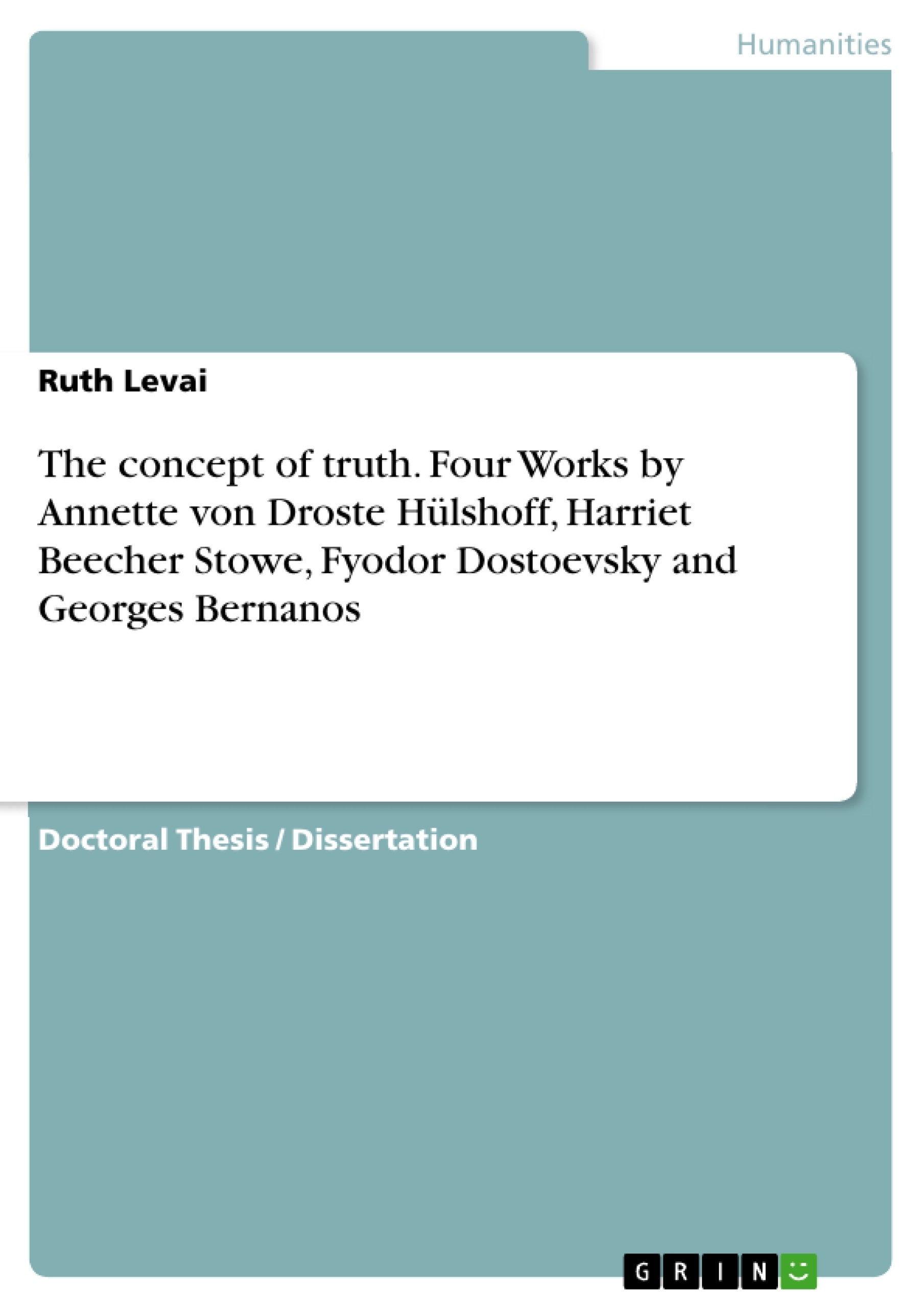Is truth necessarily unmediated? If so, can it be grasped/apprehended in its unmediated form? Or is it something that can only be engaged in this present moment in its present form? The structure of the study will be as follows: 1) a brief discussion of the influence of Enlightenment thinking upon German, French, American and Russian literature and/or culture before and throughout the authors’ lifetime, 2) an exposition of the aspects of the Enlightenment which were embraced or rejected by the authors, including a comparative look at each of their conversion experiences and how their Christian faith, though members of differing branches thereof, shaped their intellect, 3) an analysis of four specific works by the authors, demonstrating how they coincide with modern notions of truth and even precede recent discoveries about the nature of our reality, 4) and finally a discussion of the aftermath of Enlightenment assumptions in the twentieth century and the effects that they have produced in the modern and postmodern understanding of what constitutes the truth of our reality.
Perhaps the key lies in understanding the ambivalence of mimesis itself, an imprecise concept which encompasses both what modern French philosopher Jean-Luc Marion would call the icon and the idol. Speaking of representation as a conduit of truth vs. a conduit of falsehood, or the icon versus the idol Marion writes: The icon…attempts to…allow that the visible not cease to refer to an other than itself, without, however, that other ever being reproduced in the visible…it teaches the gaze, thus does not cease to correct it in order that it go back from visible to visible as far as the end of infinity, to find in infinity something new…the gaze can never rest or settle if it looks at an icon…in this sense, the icon makes visible only by giving rise to an infinite gaze.
To find in infinity something new: let this be the defining theme of our study, as it so felicitously encompasses the quest of post-Enlightenment thinkers, including our authors, Droste, Stowe, Dostoevsky and Bernanos, as well as post-relativity physicists, to grasp that reality which maintains its validity by escaping us.
Inhaltsverzeichnis (Table of Contents)
- Introduction
- Chapter I The Influence of Enlightenment Thinking in European Literature: The Power of Anxious Concern?
- Chapter II Aspects of the Enlightenment Embraced or Rejected by the Four Authors
- Chapter III Four Specific Works and the Modern Notion of Truth
- Chapter IV Modern and Postmodern Truths
Zielsetzung und Themenschwerpunkte (Objectives and Key Themes)
This dissertation examines the concept of truth in four works by Annette von Droste-Hülshoff, Harriet Beecher Stowe, F.M. Dostoevsky, and Georges Bernanos. The work explores how these authors grapple with the question of whether it is possible to understand and manipulate the inner workings of reality.
- The influence of Enlightenment thinking on European literature
- The authors' engagement with Enlightenment ideas
- The modern notion of truth in the four works
- The relationship between truth and power
- The role of dialogue in the pursuit of truth
Zusammenfassung der Kapitel (Chapter Summaries)
- Introduction: This chapter introduces the topic of the dissertation and presents the main question it seeks to answer: whether human beings can truly understand and control reality. It also explores the connection between knowledge and power and the role of the heart in the pursuit of truth.
- Chapter I The Influence of Enlightenment Thinking in European Literature: The Power of Anxious Concern?: This chapter examines the influence of Enlightenment thinking on European literature, focusing on the power of anxious concern and its impact on the pursuit of truth.
- Chapter II Aspects of the Enlightenment Embraced or Rejected by the Four Authors: This chapter analyzes how the four authors embraced or rejected aspects of Enlightenment thinking, highlighting their unique perspectives on knowledge, power, and the nature of truth.
- Chapter III Four Specific Works and the Modern Notion of Truth: This chapter delves into specific works by the four authors, examining their portrayal of the modern notion of truth and its complexities.
Schlüsselwörter (Keywords)
This dissertation focuses on the concept of truth, its relationship to power, knowledge, and the influence of Enlightenment thinking on European literature. It explores the works of Annette von Droste-Hülshoff, Harriet Beecher Stowe, F.M. Dostoevsky, and Georges Bernanos, analyzing their portrayals of truth in a modern context.
Frequently Asked Questions
Which authors are studied in this dissertation on truth?
The study analyzes works by Annette von Droste-Hülshoff, Harriet Beecher Stowe, Fyodor Dostoevsky, and Georges Bernanos.
How did the Enlightenment influence these writers?
The dissertation explores which aspects of Enlightenment thinking were embraced or rejected by the authors and how their Christian faith shaped their intellectual response to it.
What is the relationship between truth and power in the analyzed works?
The research examines whether truth is unmediated and how human beings attempt to understand or control reality, often linking knowledge to power.
What is the "icon vs. idol" distinction mentioned in the abstract?
Drawing from philosopher Jean-Luc Marion, the study uses the "icon" as a conduit of truth referring to the infinite, versus the "idol" which rests on the visible and can be a conduit of falsehood.
Does the study address modern and postmodern notions of truth?
Yes, the final chapters discuss the aftermath of Enlightenment assumptions in the 20th century and their effects on modern and postmodern understandings of reality.
- Quote paper
- Ruth Levai (Author), 2019, The concept of truth. Four Works by Annette von Droste Hülshoff, Harriet Beecher Stowe, Fyodor Dostoevsky and Georges Bernanos, Munich, GRIN Verlag, https://www.grin.com/document/992398



